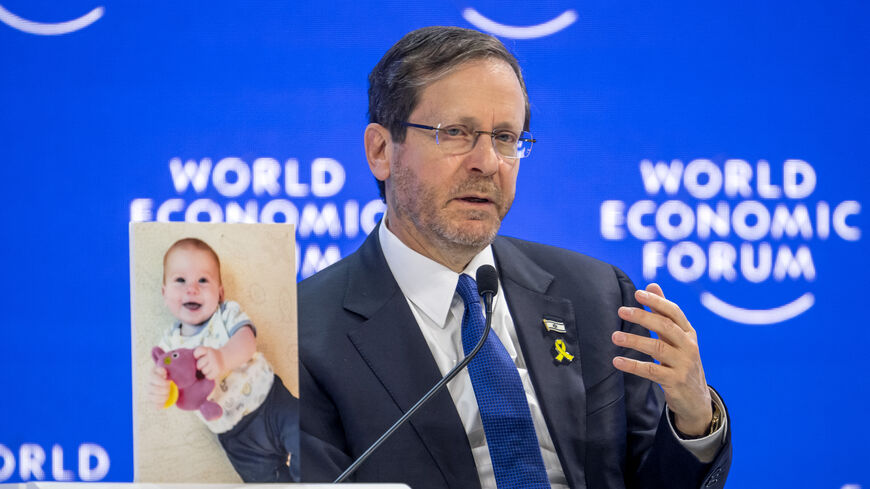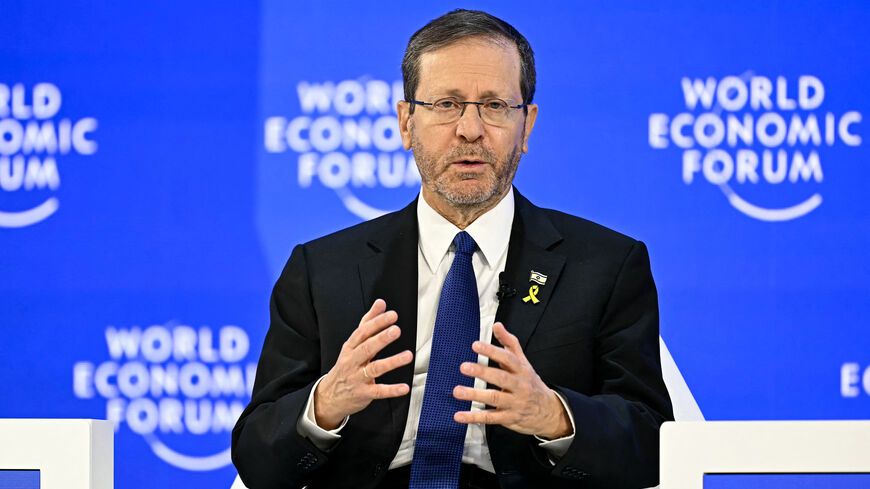Israel's Herzog warns against 'aura of optimism' over Gaza ceasefire
A truce brokered by Qatar and the US, structured in three phases, took effect on Sunday.

DAVOS — Israeli President Isaac Herzog on Tuesday cautioned the international community against falling into "an aura of optimism" over the recently announced Gaza ceasefire, urging them instead to remain "lucid about it," as he believes Iran’s aggression in the Middle East could help derail the fragile agreement.
A Qatar- and US-brokered truce went into effect Sunday, with the agreement consisting of three phases. The first phase lasts for 42 days and will see the release of 33 Israeli hostages — women, children and civilians over 50 — as well as hundreds of Palestinian prisoners. Israeli troops will partially withdraw from Gaza, and a surge in humanitarian aid will occur. Additionally, the Rafah crossing will reopen.
“I'm warning the world not to fall into kind of an aura of optimism, but rather be lucid about it,” Herzog told delegates at the World Economic Forum in Davos, Switzerland, on Tuesday. “Yes, there is an opportunity, a huge opportunity, to change the course of the Middle East for the better, but there is also a huge risk [as] long as this regime in Iran stays put and continues its efforts. It can stop its efforts, but it still continues its efforts.”
Last year, Iran launched two unprecedented direct missile attacks on Israel and also attacked the country through its proxies, including the Houthi militia in Yemen. Tehran is also allied with Hamas, Israel's enemy in Gaza.
However, Herzog said he was optimistic that the second stage of the ceasefire would be implemented. Phase two would see the remaining hostages freed and further withdrawal of Israeli forces from Gaza.
“I truly understand those who have reservations and fears, because we are going to release terrible terrorists. This is the whole equation. We are asking to release women and children, and for that, we are playing with terrorists — cruel, barbaric terrorists. But we all agree that this has to be done,” he added.
But Herzog stressed that lessons had to be learned in the process to ensure that a repeat Oct. 7 did not occur. The third phase of the proposed ceasefire agreement will see the remains of deceased hostages returned to their families and a major reconstruction plan for Gaza.
In the long term, Israel has been looking to normalize ties with Saudi Arabia following the enactment of the Abraham Accords in 2020, which saw the normalization of relations with the United Arab Emirates, Bahrain, Sudan and Morocco. In his panel discussion, Herzog repeatedly evaded questions on whether he would accept a key condition from Saudi Arabia for normalization with Israel, which is the recognition of an independent Palestinian state based on the 1967 borders.
At least 47,107 Palestinians have died in the Israeli assault on Gaza following the Hamas attack on southern Israel on Oct. 7, 2023, according to the latest figures from Gaza’s Health Ministry. The Hamas attack killed nearly 1,200 people and saw the abduction of 251 hostages.
Qatar PM 'hopeful' for two-state solution
Meanwhile, in a later panel discussion at Davos, Qatari Prime Minister and Foreign Minister Sheikh Mohammed bin Abdulrahman bin Jassim Al Thani said he was “hopeful” that the incoming Donald Trump administration in the US would be open to a two-state solution.
“We are hopeful, actually, and we have seen [that] … the critical role that they have played in the last few days of the negotiations has showed us that there is a strong leadership and determination to find solutions,” he said.
On an earlier panel discussion on the humanitarian situation in the enclave, Tom Fletcher, under-secretary-general for humanitarian affairs and emergency relief coordinator for the Office for the Coordination of Humanitarian Affairs, said that the amount needed to rebuild Gaza would almost certainly be revised upward in coming days as aid agencies calculate the scale of the damage. Currently, estimations are between $40 billion and $80 billion.
Fletcher said that conditions were "nearly impossible" to operate in during the weeks before the ceasefire was agreed upon, as barely any aid was getting into Gaza and UN aid trucks were getting fired at.
"Things have got almost impossible the last few weeks; we got to the … breaking point, really," he said, adding that the OCHA convoys were being looted.
"We lost 79 out of 80 trucks in one convoy. And then the community organizers who went in with us were taken out by Israeli drones. So, it was becoming almost impossible to deliver a fraction of what we needed to do," Fletcher added.
The UN official called for more private money and commercial operations to help bring aid into Gaza, while making a plea to the Israeli army not to fire at aid trucks.
Comfort Ero, CEO of Crisis Group, said that after months of stalling truce negotiations, Israeli Prime Minister Benjamin Netanyahu wanted to give Trump "a quick win" with the Gaza ceasefire, but there was no guarantee it would hold.


